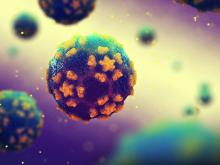Polio
Polio is a life-threatening disease caused by poliovirus. The virus is very contagious and spreads easily from person-to-person.
Polio affects the nervous system and causes muscle weakness. In some cases, polio can cause paralysis or death. There is no cure for polio, but it is preventable through safe and effective vaccination.
The vaccine used to prevent polio in the U.S. does not cause polio.
About polio
Polio is very contagious and spreads through fecal oral route. This means the virus is swallowed and then multiplies in the intestine. Someone who is infected with polio can spread the disease to others before they develop symptoms and up to two-weeks after symptoms appear. Someone can become infected with polio through:
- Contact with the poop of an infected person.
- Droplets from a sneeze or cough of an infected person.
- Touching or placing objects in your mouth that are contaminated with small amounts of poop.
The polio virus can also spread through unsanitary food and water.
Polio can be spread by people who are infected with the virus but aren’t sick or having symptoms.
All Wisconsinites can protect themselves through safe and effective vaccination. The vaccine used to prevent polio in the U.S. does not cause polio. Hand washing and good hygiene practices are also important in reducing the spread of the polio virus.
Children should get vaccinated when they are 2 months, 4 months, and 6-18 months old, and again before starting kindergarten. More than 99% of people who get all recommended doses of the polio vaccine will be protected from polio.
Most adults who were vaccinated against polio as a child are protected and do not have to get vaccinated again. Some higher risk adults should consider getting vaccinated though. Higher risk adults include:
- People who travel to parts of the world where polio spreads.
- Laboratory workers who handle poliovirus.
- Health care workers treating polio patients.
Most people infected with polio never develop any symptoms. However, about 25% of people infected with polio will have flu-like symptoms that can include:
- Sore throat
- Fever
- Tiredness
- Nausea
- Headache
- Stomach pain
These symptoms usually last two to five days but go away without treatment.
In very rare cases, people infected with polio will develop serious symptoms that affect the brain and spinal cord:
- Meningitis (inflammation of the brain and spinal cord).
- Paralysis (cannot move parts of the body) or weakness in the arms and/or legs.
There is no cure for polio, but it is preventable through safe and effective vaccination. Physical or occupational therapy can help improve arm or leg weakness and other long-term outcomes.
Polio is a Category I reportable condition in Wisconsin.
Clinicians must report suspected and confirmed polio cases immediately by telephone to the patient’s local or tribal health department. Reporting should be completed within 24 hours upon suspicion of a case.
For more information, visit the Department of Health Services (DHS) Disease Reporting page.
Wisconsin case reporting and public health follow-up guidelines:
- Polio, Communicable Disease Case Reporting and Investigation Protocol EpiNet, P-01977 (PDF): polio case reporting and investigation protocol for health professionals
- Advisory Committee on Immunization Practices (ACIP) recommendations
- CDC (Centers for Disease Control and Prevention) Global Health - Polio
- Polio Vaccine Information Statement | CDC
- Wisconsin Immunization Registry (WIR) | Wisconsin Department of Health Services
- PubMed (nih.gov)
- Polio Photos (vaccineinformation.org)
- Polio Vaccination Coverage by Zip Code Report, P-03352
- Poliovirus (Polio) Fact Sheet, P-03311 (PDF)
Questions about polio? Contact us!
Wisconsin Local Health Departments – Regional offices – Tribal agencies

